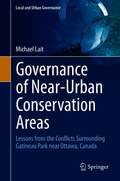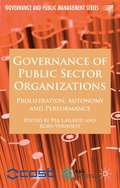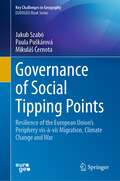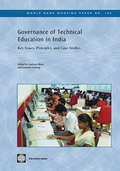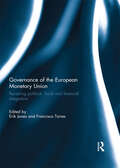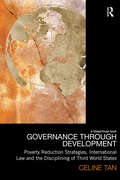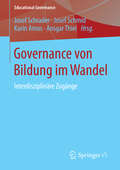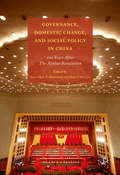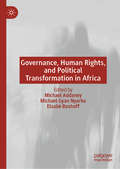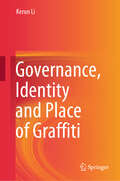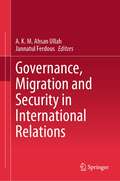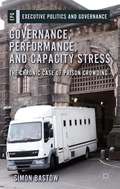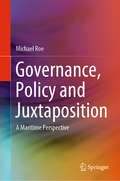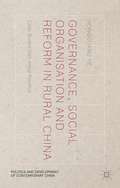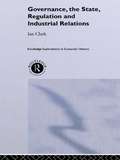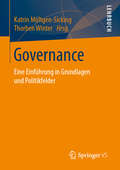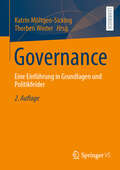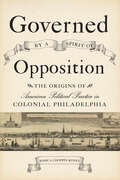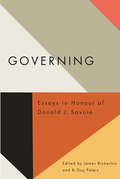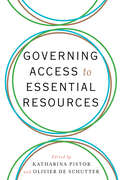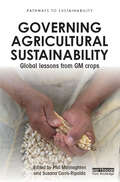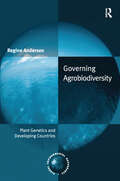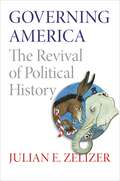- Table View
- List View
Governance of Near-Urban Conservation Areas: Lessons from the Conflicts Surrounding Gatineau Park near Ottawa, Canada (Local and Urban Governance)
by Michael LaitThis book comprehensively describes the history of Gatineau Park, from the first proposals for a “national park” in the early 1900s to the governance issues in the present period, and it highlights the issues concerning the planning and governance of this unique near-urban ecological area. The 34,500-hectare Gatineau Park is an ecologically diverse wilderness area near the cities of Ottawa (Canada’s national capital) and Gatineau. Gatineau Park is planned and managed as the “Capital’s Conservation Park” by the federal government, specifically the National Capital Commission (NCC). This monograph examines numerous governmental and non-governmental actors that are engaged in the governance of a near-urban wilderness area. Unlike Canada’s national parks, Gatineau Park’s administration involves all three levels of government (federal, provincial, and four municipalities). This book is the first to document the relations among the public and private entities, and is one of only a handful of studies concerning the governance of Canada’s National Capital Region (NCR), which is relatively unique in the literature on federal capitals. Of particular interest to students of governance will be the examination of federal-provincial relations, as the Governments of Canada and Quebec have had a notoriously strained relationship. As the first governance study of Gatineau Park, the monograph will provide readers with insight into the significance of non-state actors, showing the range of competencies that public and private groups deploy in their negotiations with NCC planners, policymakers, park managers, local and federal politicians.
Governance of Public Sector Organizations
by Per Lægreid Koen VerhoestGovernance of Public Sector Organizations a nalyzes recent changes in government administration by focusing on organizational forms and their effects. Contributors to this edited volume demonstrate how generations of reform result in increased complexity of government organizations, and explain this layering process with multiple theories.
Governance of Social Tipping Points: Resilience of the European Union’s Periphery vis-à-vis Migration, Climate Change and War (Key Challenges in Geography)
by Jakub Szabó Paula Puškárová Mikuláš ČernotaThis monograph assesses the intersections between social tipping points (STP), a relatively understudied social-ecological concept, and various public policy concepts, such as governance, state capacity and resilience of the state and non-state actors, all within the context of the EU Eastern and Southern periphery. This unique approach is subsequently embodied in the newly created conceptual framework of how the STPs are governed and analyzed using three case studies. The goal is to examine how various state and non-state actors (transnational, private, and local) have managed to navigate the STPs triggered by migration, climate change, and geopolitics. The multi-level governance of STPs is studied within the context of the EU periphery, thus spatial and geographical determinants of the resilience are analyzed as well.
Governance of Technical Education in India
by Andreas Blom Jannette CheongReforms are imperative for the huge and complex technical education system in India. A recent Learning Forum brought together senior policy makers and institutional leaders that elaborated a nine-point agenda to achieve good governance, a key to successful reforms in this area. The forum agenda and this paper build upon studies summarizing generic trade-offs, challenges, and experiences, from five Indian state governments, and global failures and successes, to balance demands for greater institutional autonomy with the government's need to direct strategic economic development and enhance participation in higher education.
Governance of the European Monetary Union: Recasting Political, Fiscal and Financial Integration (Journal of European Integration Special Issues)
by Erik Jones and Francisco TorresThe crisis in the euro area is a defining moment in the history of European integration. It has revealed major flaws in the architecture of the European Union; it has challenged European institutions to shape an appropriate response; and it has tested the patience of a European public that is eager to see their economic prospects improve again. This volume brings together some of the world’s top economists and policymakers to explain how this crisis came about and what is to be done. The policy agenda these chapters establish is going to be difficult to implement, not least because of popular misunderstanding and political opposition. This book argues, that it is essential that European policymakers push forward this agenda or they run the risk of seeing Europe’s economies fall back into crisis. This book was previously published as a special issue of the Journal of European Integration.
Governance through Development: Poverty Reduction Strategies, International Law and the Disciplining of Third World States (Law, Development and Globalization)
by Celine TanGovernance through Development locates the Poverty Reduction Strategy Paper (PRSP) framework within the broader context of international law and global governance, exploring its impact on third world state engagement with the global political economy and the international regulatory norms and institutions which support it. The PRSP framework has replaced the controversial structural adjustment programmes, as the primary mechanism through which official development financing is channelled to low-income developing countries. It has changed the regulatory landscape of international development financing, signalling a wider paradigmatic shift in the cartography of aid and, consequently, in the nature of north-south relations. Governance through Development documents and analyses this change within the legacy of postcolonial economic relations, revealing the wider legal, economic and geo-political significance of the PRSP framework. Celine Tan argues that the PRSP framework establishes a new regulatory regime that builds upon the disciplinary project of structural adjustment by embedding neoliberal economic conditionalities within a regime of domestic governance and public policy reform. The book will be of interest to scholars, researchers and students of law, political science and international relations, sociology and development studies.
Governance through Social Learning
by Gilles PaquetThis book rejects these simplistic views in favour of a more distributed view of governance based on a mix of coercion, quid pro quo market exchange and reciprocity, on a division of labour among the private, public, and civic sectors, and on the co-evolution of these different integration mechanisms.
Governance von Bildung im Wandel
by Josef Schrader Josef Schmid Karin Amos Ansgar ThielIn den letzten Jahren sind tiefgreifende Veränderungen der institutionellen Regelungsstrukturen der europäischen Bildungssysteme zu beobachten. Inzwischen hat sich mit der Educational Governance ein eigenständiger Forschungsbereich etabliert, der sich der Transformation von Steuerungsformen im Bildungsbereich zuwendet. Ziel des vorliegenden Bandes ist die Analyse der veränderten Governance-Praxen. Die Aufmerksamkeit der empirischen Beiträge ist dabei vor allem auf national und sektoral unterschiedliche Prozesse und Wirkungen von Governance-Modi gerichtet. Darüber hinaus werden theoretische und methodische Weiterentwicklungen der interdisziplinär verstandenen Educational-Governance-Forschung zur Diskussion gestellt.
Governance, Conflict, and Natural Resources in Africa: Understanding the Role of Foreign Investment Actors
by Hany Gamil BesadaA country's abundant natural resources may serve as a curse or a blessing, with the outcome often dependent on prevailing governance structures and experience managing these assets. Despite natural resource advantages, many African countries have failed to transform their enormous economic potential and wealth into tangible benefits such as sustainable socio-economic development, human security, or peace.Governance, Conflict, and Natural Resources in Africa reevaluates the role that foreign state-owned and private-sector actors play in resource-rich states – whether stable, post-conflict, or fragile – in sub-Saharan Africa. Through research and an analysis of in-depth interviews with local stakeholders in Ghana, Sierra Leone, and Ethiopia, Hany Besada explains how foreign state-owned and private-sector corporations have contributed to economic growth at both the national and local levels in different resource-rich countries. This book reveals the unique challenges and opportunities created by these investors, demonstrating that new policies in business practices and operations have the potential to generate sustainable development and positive economic transformation.Governance, Conflict, and Natural Resources in Africa puts forward a novel framework for understanding the role of private economic actors in extractive industries in Africa and sheds new light on foreign private-sector contributions to capacity building and economic development.
Governance, Domestic Change, and Social Policy in China: 100 Years after the Xinhai Revolution
by Jean-Marc F. Blanchard and Kun-Chin LinThis book constitutes the first comprehensive retrospective on one hundred years of post-dynastic China and compares enduring challenges of governance in the period around the collapse of the Qing dynasty in 1911 to those of contemporary China. The authors examine three key areas of domestic change and policy adaptation: social welfare provision, local political institutional reform, and social and environmental consequences of major infrastructure projects. Demonstrating remarkable parallels between the immediate post-Qing era and the recent phase of Chinese reform since the late-1990s, the book highlights common challenges to the political leadership by tracing dynamics of state activism in crafting new social space and terms of engagement for problem-solving and exploring social forces that continue to undermine the centralizing impetus of the state.
Governance, Human Rights, and Political Transformation in Africa
by Michael Addaney Michael Gyan Nyarko Elsabé BoshoffThis edited volume examines the development and challenges of governance, democracy, and human rights in Africa. It analyzes the emerging challenges for strengthening good governance in the region and explores issues related to civil, political, economic, cultural, and social rights highlighting group rights including women, girls, and other minority groups. The project presents a useful study of the democratization processes and normative developments in Africa exploring challenges in the form of corruption, conflict, political violence, and their subsequent impact on populations. The contributors appraise the implementation gap between law and practice and the need for institutional reform to build strong and robust mechanisms at the domestic, regional, and international levels.
Governance, Identity and Place of Graffiti
by Kerun LiThis book offers a comprehensive overview of graffiti culture in China, particularly through the example of graffiti in the Furong Tunnel at Xiamen University. It explores the complex relationship between graffiti as an art form and social behavior, focusing on its definition, legality, public space conflicts, sense of place, and interactions under management systems. Firstly, the book discusses the varying definitions of graffiti in Western and Chinese contexts. Using the Furong Tunnel graffiti as a case study, it examines the line between artistic expression and vandalism, highlighting issues of legality, sense of place, and publicness. Secondly, it delves into the practice of graffiti in public spaces, particularly within Xiamen University. The graffiti in the Furong Tunnel has sparked debates about the conflict between educational and social functions, altering the tunnel's spatial form and function. It has become a focal point for conflicts between tourists and students, reflecting the complexity of campus space. The book also explores how graffiti constructs a sense of place and its associated social conflicts. By tracing the historical development of tunnel graffiti, it shows how graffiti becomes a collective memory and cultural symbol, serving as a medium for students to express emotions and construct local identities. Furthermore, the book addresses the legality of graffiti and the negotiation among actors under management systems. Although not legally considered a tourism resource, the university's stance is ambiguous, balancing strict regulations with using graffiti for publicity. Specific incidents of vandalism highlight conflicts between graffiti culture and campus management, discussing issues of protection and restoration. Lastly, the book examines ownership and management of graffiti. Conflicts over preservation and usage rights between students and tourists show the university's role as a coordinator. It emphasizes graffiti's importance in campus culture and as a promotional tool, while also noting that management measures might limit free expression, leading to homogenization concerns. Using multiple research methods, this book explores the social and political implications of graffiti, emphasizing the interactions and conflicts among stakeholders. It reveals the significance of graffiti in Chinese society and offers solutions to issues concerning graffiti culture in contemporary China.
Governance, Migration and Security in International Relations
by Jannatul Ferdous A. K. M. Ahsan UllahThe book deconstructs the interplay between governance, migration, international relations, and security as a complex and constantly evolving dynamic that has significant implications for individuals, societies, and nations around the world. This book shows that the connections between governance, migration, international relations, and security have become increasingly significant for several reasons. First, it unpacks how globalization has led to an unprecedented level of interconnectedness between nations, resulting in a need for increased understanding of how governance frameworks, migration patterns, and international relations impact security both within and between nations. Second, it shows that the movement of people across borders has become a significant challenge, with more people on the move now than at any time in human history. Third, it highlights the increasingly complex and interdependent nature of international relations, which requires a nuanced understanding of howdifferent actors, including governments, international organizations, and non-state actors, interact and influence each other. Fourth, the book addresses how security concerns have become increasingly pressing in today's world, with the rise of non-state actors, such as terrorist groups, as well as the proliferation of cyber threats. The book positions that an understanding of these dynamics, and their implications, is critical for both academics and policymakers, to build effective international partnerships and respond to global challenges such as climate change, pandemics, and economic crises. It is relevant to researchers across the social sciences, including development studies, international relations, global politics, migration, public health, and environmental policy.
Governance, Performance, and Capacity Stress
by Simon BastowPublic policy systems often sustain chronic capacity stress (CCS) meaning they neither excel nor fail in what they do, but do both in ways that are somehow manageable and acceptable. This book is about one archetypal case of CCS - crowding in the British prison system - and how we need a more integrated theoretical understanding of its complexity.
Governance, Policy and Juxtaposition: A Maritime Perspective
by Michael RoeThis book considers governance and policy-making within the maritime sector, and focuses significantly on the dimensional context within which governance works. Recognising the importance of understanding governance and policy at times when the world is faced with social, political, and economic problems, it highlights the fact that both areas are equally significant in understanding today’s political economy. By focusing on the maritime sector, a pillar industry supporting international trade activities, the book offers a unique perspective to explain the difficulties of balancing policy-making with governance in order to provide solutions. It also examines the importance of developing a governance process that encourages and accommodates juxtaposition in a way that ensures that the effect of independent policy-making is understood upon the success or otherwise of policies across a range of contexts and problems.Given the in-depth nature of the text, it is of interest to academics, researchers and professionals in the field.
Governance, Social Organisation and Reform in Rural China
by Hongguang HeXiaogang village, located in Anhui Province, was reputedly the first village in China to decollectivise in 1978, paving the way for agricultural reform and a new rural economy in China. This study explores how farmers in Xiaogang have engaged in various forms of cooperation in the decades since decollectivisation and the extent to which changing political and social contexts of the rural China are likely to impact upon the way in which farmers cooperate and collaborate with each other. In an attempt to understand the relationship between farmers and the state in a rapidly changing China, the text focuses upon governance and social organisation within the village and explores the extent to which farmers have autonomy in both their economic and political activities. While decollectivisation is often interpreted as the second 'liberation' of Chinese farmers, it is clear that new power structures have emerged to replace those of the collective and the commune. While many studies have explored this question in terms of a so-called binary opposition between the state and the community, they have tended to neglect the subtleties behind this opposition. Utilising Foucault's concept of 'governmentality', this study develops new ways of understanding micro-level power relations that enable and constrain certain forms of political and economic activity within the village.
Governance, The State, Regulation and Industrial Relations (Routledge Explorations in Economic History #Vol. 20)
by Ian ClarkThis book examines the legacy of economic and political aims and objectives formulated by the British government during, and immediately after the second world war. It examines contemporary patterns of regulation by the state, and reform in the industrial relations system as factors of these historically embedded influences. This book makes an important contribution to the history and theory of British post-war economics.
Governance: Eine Einführung in Grundlagen und Politikfelder
by Katrin Möltgen-Sicking Thorben WinterDieses Lehrbuch präsentiert in 14 Beiträgen einen komprimierten Überblick über den Themenkreis "Governance." Dazu ist der Band in drei Teile gegliedert: Der erste Teil widmet sich Akteuren und Steuerungsmodi sowie den einzelnen administrativen Ebenen von Governance. Der zweite Teil analysiert ausgewählte Politikfelder (Haushalt, Sicherheit, Umwelt/Nachhaltigkeit, Regionales, Integration, Kultur, Hochschule), während der abschließende Teil des Bandes einen internationalen und bewertend evaluierenden Blick auf den Themenkreis „Governance“ einnimmt.
Governance: Eine Einführung in Grundlagen und Politikfelder
by Katrin Möltgen-Sicking Thorben WinterDieses Lehrbuch präsentiert in neuer Auflage und 17 Beiträgen einen komprimierten Überblick über den Themenkreis "Governance". Dazu ist der Band in drei Teile gegliedert: Der erste Teil widmet sich Akteuren und Steuerungsmodi sowie den einzelnen administrativen Ebenen von Governance. Der zweite Teil analysiert ausgewählte Politikfelder (Haushalt, Sicherheit, Umwelt/Nachhaltigkeit, Regionales, Integration, Kultur, Hochschule), während der abschließende Teil des Bandes einen internationalen und bewertend evaluierenden Blick auf den Themenkreis „Governance“ einnimmt.
Governed by a Spirit of Opposition: The Origins of American Political Practice in Colonial Philadelphia (Studies in Early American Economy and Society from the Library Company of Philadelphia)
by Jessica Choppin RoneyCivic engagement in the City of Brotherly Love gave birth to the American Revolution.Winner of the Athenaeum of Philadelphia Literary Award of The Athenaeum of PhiladelphiaDuring the colonial era, ordinary Philadelphians played an unusually active role in political life. Because the city lacked a strong central government, private individuals working in civic associations of their own making shouldered broad responsibility for education, poverty relief, church governance, fire protection, and even taxation and military defense. These organizations dramatically expanded the opportunities for white men—rich and poor alike—to shape policies that immediately affected their communities and their own lives. In Governed by a Spirit of Opposition, Jessica Choppin Roney explains how allowing people from all walks of life to participate in political activities amplified citizen access and democratic governance. Merchants, shopkeepers, carpenters, brewers, shoemakers, and silversmiths served as churchwardens, street commissioners, constables, and Overseers of the Poor. They volunteered to fight fires, organized relief for the needy, contributed money toward the care of the sick, took up arms in defense of the community, raised capital for local lending, and even interjected themselves in Indian diplomacy. Ultimately, Roney suggests, popular participation in charity, schools, the militia, and informal banks empowered people in this critically important colonial city to overthrow the existing government in 1776 and re-envision the parameters of democratic participation. Governed by a Spirit of Opposition argues that the American Revolution did not occasion the birth of commonplace political activity or of an American culture of voluntary association. Rather, the Revolution built upon a long history of civic engagement and a complicated relationship between the practice of majority-rule and exclusionary policy-making on the part of appointed and self-selected constituencies.
Governing
by B. Guy Peters James BickertonTo honour the distinguished career of Donald Savoie, Governing brings together an accomplished group of international scholars who have concerned themselves with the challenges of governance, accountability, public management reform, and regional policy. Governing delves into the two primary fields of interest in Savoie's work - regional development and the nature of executive power in public administration. The majority of chapters deal with issues of democratic governance, particularly the changing relationship over the past thirty years between politicians and public servants. A second set of essays addresses the history of regional development, examining the politics of regional inequalities and the promises and pitfalls of approaches adopted by governments to resolve the most vexing policy problems. Contributors provide readers with a valuable primer on the key issues that have provoked debate among practitioners and students of government alike, while reflecting on government initiatives meant to address inadequacies. Showcasing the practical experience and scholarly engagement of its authors, this collection is a valuable addition to the fields of public administration, public policy, political governance, and regional policy. Contributors include Peter Aucoin (Dalhousie University), Herman Bakvis (University of Victoria), James Bickerton (St Francis Xavier University), Jacques Bourgault (École nationale d'administration publique/UQAM), Thomas Courchene (Queen's University), Ralph Heintzman (University of Ottawa), Mark D. Jarvis (University of Victoria), Lowell Murray (Senate of Canada, retired), B. Guy Peters (University of Pittsburgh), Jon Pierre (University of Gothenburg) Mario Polèse (INRS-UCS), Christopher Pollitt (Leuven University), Donald J. Savoie (Université de Moncton), and Paul G. Thomas (University of Manitoba).
Governing Access to Essential Resources
by Olivier Katharina Pistor De SchutterEssential resources do more than satisfy people's needs. They ensure a dignified existence. Since the competition for essential resources, particularly fresh water and arable land, is increasing and standard legal institutions, such as property rights and national border controls, are strangling access to resources for some while delivering prosperity to others, many are searching for ways to ensure their fair distribution.This book argues that the division of essential resources ought to be governed by a combination of Voice and Reflexivity. Voice is the ability of social groups to choose the rules by which they are governed. Reflexivity is the opportunity to question one's own preferences in light of competing claims and to accommodate them in a collective learning process. Having investigated the allocation of essential resources in places as varied as Cambodia, China, India, Kenya, Laos, Morocco, Nepal, the arid American West, and peri-urban areas in West Africa, the contributors to this volume largely concur with the viability of this policy and normative framework. Drawing on their expertise in law, environmental studies, anthropology, history, political science, and economics, they weigh the potential of Voice and Reflexivity against such alternatives as pricing mechanisms, property rights, common resource management, political might, or brute force.
Governing Agricultural Sustainability: Global lessons from GM crops (Pathways to Sustainability)
by Phil Macnaghten Susana Carro-RipaldaAlthough GM crops are seen by their advocates as a key component of the future of world agriculture and as part of the solution for world poverty and hunger, their uptake has not been smooth nor universal: they have been marred by controversy and all too commonly their regulation has been challenged as inadequate, even biased. This book aims to understand these dynamics, examining the impacts of GM crops in diverse contexts and their potentials to contribute to sustainable agricultural futures. Part 1 draws on research from three global ‘rising powers’ – Brazil, India and Mexico – exploring the views of scientists, farmers and publics. Using a diverse array of ethnographic and qualitative methodologies, the book examines the dynamics that have underpinned the controversy in three diverse geo-political contexts, the manner in which dominant institutional framings have been closely aligned with the interests of powerful elites, and the multiple ways in which these have been resisted through local, symbolic and material practices. Part 2 comprises a series of short comment pieces from 11 leading social and natural scientists responding to the question of how to develop a policy framework for the responsible innovation of sustainable, culturally appropriate and socially just agricultural GM technologies. This innovative book offers new insights for researchers and postgraduates in Science and technology studies, Agro-ecology and Environmental Studies, Development studies, Anthropology, Human Geography, Sociology, Political Science, Public Administration, Latin American studies, and Asian studies.
Governing Agrobiodiversity: Plant Genetics and Developing Countries (Global Environmental Governance)
by Regine AndersenPlant genetic diversity is crucial to the breeding of food crops and is therefore a central precondition for food security. Diverse genetic resources provide the genetic traits required to deal with crop pests and diseases, as well as changing climate conditions. Plant genetic diversity is also essential for traditional small-scale farming, and is therefore an indispensable factor in the fight against poverty. However, the diversity of domesticated plant varieties is disappearing at an alarming rate while interest in the commercial use of genetic resources has increased in line with bio-technologies, followed by demands for intellectual property rights. This important book contributes to our understanding of how international regimes affect the management of plant genetic resources for food and agriculture in developing countries. It identifies entry points to shape a better governance of agrobiodiversity and provides the first comprehensive analysis of how the international agreements pertaining to crop genetic resources affect the management of these vital resources for food security and poverty eradication in developing countries.
Governing America: The Revival of Political History
by Julian E. ZelizerNew perspectives on American political history from one of its leading writersIn recent years, the study of American political history has experienced a remarkable renaissance. After decades during which the subject fell out of fashion and disappeared from public view, it has returned to prominence as the study of American history has shifted its focus back to politics broadly defined. In this book, one of the leaders of the resurgence in American political history, Julian Zelizer, assesses its revival and demonstrates how this work not only illuminates the past but also helps us better understand American politics today.
